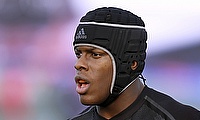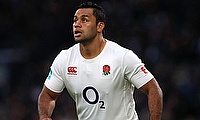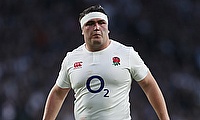Mike Rhodes Exclusive: 'Let’s make it as safe as we can, but not change the game that we all love'

Mike Rhodes won six trophies during his time with Gallagher Premiership side Saracens
©Wired Photos
It was Saturday morning when Mike Rhodes tweeted about the Rugby Football Union’s decision to reduce tackle height in the community game.
The South African will be a familiar face to many, the former back-row forward having pulled on a Saracens jersey before retiring. During his time in the northern hemisphere, the 35-year-old lifted three Premiership and three Heineken Champions Cup crowns.
Learning the news from afar that changes to tackle laws in English community rugby will be made from the start of the 2023/24 season, Rhodes posted on social media that ‘The people making these decisions just have no idea and are so out of touch with the game! Ruining ruggers imo’.
It was a view shared by several former and current professional players, many of whom similarly took to social media to voice their own concerns with Rhodes of the belief that it was only a matter of time until a decision like this was made.
“You know for me they are trying to make rugby so safe, to the point that actually the game is changing from what it was,” Rhodes told TRU.
“Never mind the fact that I do think the tackler will get a lot more injured when he is made to tackle at that level. I think you will see concussions, neck injuries, all that kind of thing will increase.
“My reaction, and it has sort of been trending this way for a number of years, when you try to make the game as safe as possible - which of course we all want because we don’t want to ever see any injuries - but you have got to accept some level of risk when playing rugby.
“If you or your parents, or whatever the case may be, are worried about getting injured in any way, then it is my feeling that you should most likely not play rugby. If that’s the ultimate concern, a contact sport is probably not what you are looking for.
“The game we all love is a physical, hard game, and when you try to mould it into something that it has never been, I feel that you lose the essence of the game. It is a bit like rugby league.
“Rugby league, they have taken the stance of ‘it is a hard, physical game and there are going to be risks of being injured, we will do what we can, but we are not going to change it to the point where it is becoming unrecognisable’.
“That is my feeling, and it has been trending that way for quite some time. I think a lot of rules have been changed to this effect and, I suppose, I just feel it is a bit sad. Maybe I am a bit old now, that the game is changing, and it is going to be penalty after penalty after penalty.
“We saw the Saracens game on the weekend [v Edinburgh] where there were a couple of yellow cards for high tackles. My initial feeling is just let’s make it as safe as we can, but not change the game that we all love.”
Rhodes’ thoughts are echoed by thousands across the rugby community in England. In less than a week since the announcement, a petition against the RFU Council’s decision has received over 71,000 signatures while on Tuesday evening, The Telegraph reported that the backlash could reverse this change.
Earlier this week TRU heard from Clifton’s Luke Cozens about the reduction in tackle height, the fly-half having played and coached in France when a similar law variation was introduced in 2019 as part of a trial. The playmaker dismissed concerns about any changes to mauling and rucking, while on the whole, he felt as though not enough was made clear by England’s governing body.
As a recently retired professional player, Rhodes can offer his own unique perspective from over a decade in the trenches, the South African believing that tackling lower will lead to an increase in injury.
“For myself, I am a tall guy, so I used to tackle fairly high,” Rhodes said. “I guess there are advantages to tackling high. You look at the sport, slowing down the ball, holding up players, a lot of the time it is easier to manipulate an attacking player when you tackle them around chest height, so there are a lot of advantages to doing it.
“Personally, I don’t think I was ever injured or concussed from tackling at chest height so I think you will find there will be a lot more injuries to the defending player if they are made to tackle that low. It is a huge advantage to the attacking player.
“The ball carrier can manipulate that player a lot more, and I think it will be so one-sided. It will be penalty after penalty and, unfortunately, probably more injuries.
“I don’t know if it is the lawmakers, or who it is, they often underestimate the amount of time you have to make a decision on the field. That’s why sometimes I question who is making these laws.
“A player has a split-second to make a decision and that split-second is the difference between a legal tackle and a high tackle. If you bring this new law in, you just bring more cards into it, penalties and I feel like the whole game will deteriorate, unfortunately.
“It will end up being so stop-start you won’t get any momentum. I think these red cards, a lot of them we are seeing at the moment, are ruining games. Once a team gets a red card, the game is basically over. I think there is way more negatives to be gained from this rule changes than there are positives.”
Part of what has created the saga surrounding the changes is the lack of clarity which has come along with it. Last Thursday, the only additional information about the decision was that there would be a dearth of coaching information coming in the near future, but an exact date was not stated.
What is clear is that a series of scientific studies have led to this decision. In recent years, research has been carried out in France, New Zealand, South Africa and even England, when the Championship Cup pool stages saw tackle height reduced, although the study was brought to an abrupt stop.
For those not involved in the decision-making process and without access to the same information which the RFU Council used to make their decision, it has only perpetuated the concerns that thousands have raised in the past six days.
“I would like to see them [the studies], actually,” Rhodes said. “I am sure they do have stats that do support their decision and I am sure they are focused on this from a concussion point of view and that is perfect, that is great. We should do all we can to get rid of those injuries.
“In the same breath, this is rugby. This is a contact sport, you will never get rid of those injuries, you will never get rid of all concussions, and you have to accept some level of risk as players when you play.
“A lot of the time, I don’t feel like this is a rule driven by any players or any complaints or anything like that. It is driven from the top down because they are trying to mitigate as many injuries as possible, but it is to the detriment of the game in my opinion.
“The game just becomes unplayable and, quite frankly, much harder for referees. It is almost un-reffable the way it is already. The number of things that referees are made to look out for now is absurd. No wonder fans are complaining more than ever. It is impossible.
“It would be good to see those stats. I am sure they do point in the direction of the RFU’s decision, but sometimes to keep the nature of the game that we love, it can’t all be stats driven.”









